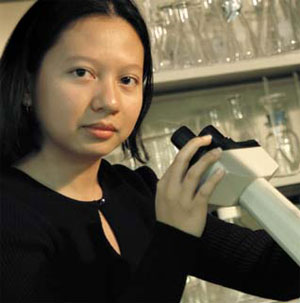| Q&A with UTA's oldest living graduate | Alumni as college presidents | Recognition of contributors |
 |
||
| Home Forethought Campus Buzz Feature Stories Re:Search The Score Alum News Yesteryear | ||
|
|
| Marisol Chang |
Allergy sufferers, take heart. Marisol Chang is working on a way to help.
Last summer, Chang was among 12 students to receive the Undergraduate Summer Research Fellowship from the American Physiological Society for her research on how mast cells function when they are exposed to acidic pH (the relative acidity or alkalinity of a solution).
“These mast cells are cells of the immune system, and they are responsible for symptoms of allergies,” she explained. “If you get a runny nose, itchy eyes or you have an area that is red or swollen, these symptoms are created by mast cells.”
Chang began the study in summer 2003 and, with the help of biology Assistant Professor Malgosia Wilk-Blaszczak, applied for the APS fellowship last spring. The fellowship includes a $2,000 stipend to continue the research, plus up to $1,000 in travel expenses to the Experimental Biology 2005/International Union of Physiological Sciences meeting in San Diego, which is expected to attract 12,000 scientists.
“The prestige of this award comes from being recognized among so many applicants from all kinds of universities, including Ivy League schools,” Dr. Wilk-Blaszczak said. Winners this year included students from Yale University, Stanford University, the University of Dayton, University of Wisconsin and Williams College.
The selection is based on academic merit and the availability of an appropriate faculty mentor. Chang, who’s now classified as a graduate student, has a dual major in biology and biomedical engineering.
Originally from Colombia, she moved to Texas with her parents in 2000 and began attending Tarrant County College. She transferred to UTA in 2001 and hopes to complete the five-year B.S./M.S. program by spring 2006.
“Marisol is an exceptional, mature student you don’t meet very often,” said Wilk-Blaszczak, who holds both M.D. and Ph.D. degrees. “She has mastered a variety of techniques well enough that she is now training new students who join the lab. She’s not the type of student who knows an answer to every question, but she’s definitely the type who will find one. Her ability to get to the heart of the matter will make her an outstanding scientist.”
While the fellowship funding was for last summer, Chang continues to work on the research and will present an abstract at the experimental biology meeting in April. She hopes her presentation will be one of many she’ll give while making science her life’s work. After graduation, she plans to continue in a doctoral program.
“Eventually I hope to work in biomedical or tissue engineering, which involves more of the mechanical forces of the cells,” she said.
With the future Dr. Chang’s help, perhaps we’ll all breathe a little easier.
— Jim Patterson
| Archives
| Alumni Association |
Giving to UTA | UTA
Home Copyright © 2005 UTA Magazine. All rights reserved. |
